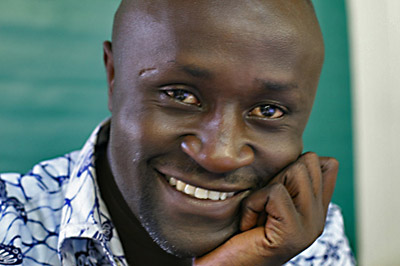While fighting continues [1] in the North Kivu province of the DR Congo in spite of a well-publicised ceasefire, in the relatively peaceful neighboring province of South Kivu yet another journalist has been murdered. On the 21st of November Didace Namujimbo, who worked for the UN-backed Radio Okapi, was shot in the head [2] when he was returning to his home in the evening.

Spanish journalist Hernán Zin met Namujimbo in his office when he traveled to Bukavu last summer to report on sexual violence as a weapon of war. He described him [3] in his blog Viaje a la guerra [Es] (Journey into war):
Un hombre alto, de buena presencia, que hablaba un francés impoluto. El primer rostro amigo que encontré en el Congo.
And he added [Es]:
Además de una honda tristeza, me vuelven recuerdos de las conversaciones que mantuvimos sobre la muerte de su compañero Serge Maheshe [4], el 13 de junio de 2007. Hablamos sobre quiénes podrían ser los culpables, pues yo tenía la intención de incluir su historia en la sección de este blog Morir para contar [5].
Radio Okapi news editor Serge Maheshe had been shot in the head on the evening of the 13th of June 2007 when he was returning home, in the exact same way as his colleague and friend Didace Namujimbo a year and a half later. A year after Maheshe's murder, former Kinshasa Radio Okapi journalist Cédric Kalonji wrote [6] [Fr] about the impunity for such crimes in the DRC:
Je constate amèrement que la justice, pilier de l’autorité de l’État qui est le fondement même de la démocratie ne fonctionne pas au Congo. Quand aurons-nous, et qui rétablira une justice efficace et indépendante dans ce pays?
Now Cédric Kalonji wonders [7] [Fr] again about the state of democracy in his country:
En apprenant cette nouvelle, je suis partagé entre douleur, tristesse et colère. Je me demande comment la démocratie s’installera durablement dans un pays où on est visiblement allergique aux journalistes indépendants et professionnels. Devons-nous laisser le Congo entre les seules mains des hommes forts, ceux qui sont armés?
Kalire [Fr] thinks [8] that Didace Namujimbo's murder represents many others:
Comme Didace, ils sont nombreux à se faire tuer dans le Kivu.
Se faire tuer par «des inconnus», par on ne sait même pas qui: des «rebelles»? des militaires congolais? des bandes de pillards? des voisins jaloux?
Comme Didace, ils sont des centaines à se faire tuer, violer par des «inconnus».
Mais Didace est… était journaliste.
C’est pourquoi sa mort peut parler pour celle des autres.
Being killed by “strangers”, we don't even know who: “rebels”? Congolese servicemen? gangs of looters? jealous neighbors?
Like Didace, there are hundreds of people being killed, being raped by “strangers”.
But Didace is… was a journalist.
That's why his death can speak for that of others.
Freddy Mulongo [Fr] at the Radio Revéil FM blog, remembers the six media professionals that have been murdered in similar circumstances during the last three years, including Didace Namujimbo and Serge Maheshe. In his post, he summarizes what all those cases have in common [9]:
Les scénarios sont les mêmes: tous les journalistes congolais sont tués la nuit, à proximité de leur domicile, on retrouve sur eux l'argent mais leur appareils téléphoniques… Et après on arrête des “innocents” que l'on présente comme des assassins. On organise une mascarade de procès souvent dans un auditorat militaire, il arrive parfois que les présumés assassins se rebiffent, pendant ce temps les vrais commanditaires courent toujours et jouissent de l'impunité.
For Freddy Mulongo, the situation of media professionals in the DRC is grim:
Ils sont journalistes et professionnels des médias en danger car comme le dit si bien l'adage des Peuls dans l'extrême Nord du Cameroun: “Si on rase ton camarade. Mouille-toi la tête, ton tour arrive!” A qui le tour? Qui sera le prochain victime?
Colette Braeckman [Fr] , a Belgian journalist and author expert in Central Africa, upon learning about Didace Namujimbo's murder wondered [10]:
Comment concilier ces assassinats, qui semblent être d’origine mafieuse ou politique, avec l’état de droit dont les élections de 2006 auraient du marquer la naissance, avec « la fin de la récréation » solennellement annoncée par le président le jour de son investiture?
Also this week Human Rights Watch has released a new report titled “We will crush you [11]“, on the restriction of political space in the DRC in which as Colette Braeckman notes “they pass a very hard judgement on the two years following the elections”. In the summary of the report they wrote [12]:
Government agents have also threatened, arrested, tortured, and otherwise harassed journalists and members of civil society who were linked to political opponents or who protested abuses against them.
The summary concludes:
Elections themselves cannot bring democracy. Congolese and international actors must work to establish an independent judiciary and a vibrant parliament with an effective opposition to improve human rights, hold the executive to account for its actions, and counterbalance the restriction of political space. Failure to establish such counterweights will endanger Congo’s young democracy.
(Photo of Didace Namujimbo [13] in his Radio Okapi office in Bukavu, taken last May by Elia Varela Serra)